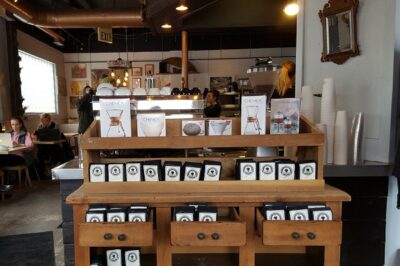Many of our communities are identified by what they make-my hometown of Chelsea is instantly identifiable as the home of Jiffy Mix-but for too many, that identity is past tense: the plant closed, and they don’t make that anymore. The skills and passion for making something remain, though, and can be tapped to grow both good jobs and good places through a focus on many small businesses to replace the few big ones.
ReCast City’s Ilana Preuss has worked with communities around the country to understand small-scale manufacturing sectors. This week, the I-69 Thumb Region hosted a workshop with Ilana to look at how we can cultivate these businesses locally.

When the wind is right, I can smell this small manufacturer’s roaster from my house–free advertising! (Cross Street Coffee in Ypsilanti)
Preuss defines a “small-scale manufacturer” as any business that makes something physical that can be packaged and sold, with between one and twenty employees. This can be anything from microbreweries to jewelry makers to small tool-and-die shops.
Why small-scale manufacturing?
The benefit of “small” is that the owner tends to live where their business is (or, in some cases, the business is in their home), so is more rooted in the community than a branch of a large national employer-and, if they do pick up stakes and leave, the blow to the community is limited.
The benefits of “manufacturing” are several. They hire locally, and the jobs grown this way tend to pay significantly better than the service sector. They bring money into the community when they become large enough to distribute, whether through traditional channels or online direct sales. They often source raw materials locally (especially in food products), supporting suppliers in the community.
As part of a placemaking strategy, these businesses can utilize spaces that would require too much buildout for traditional retail, filling in gaps in a small downtown; they don’t rely on foot traffic for their primary business, but they can create it, helping to support retailers and cafe’s around them. And, their products are often unique, helping to build recognition for the entire community.
Pollinating the small production sector
At the League’s Convention this fall, keynote Michael Shuman urged the adoption of a “pollinator” approach to local economic development: supporting small business growth by making connections between people and resources within the community.
Preuss’ session in Lapeer was a how-to on this theme, walking participants through the steps to identify and grow this sector in their own town. These include:
- Build from local skills, resources, and history-cultivate the seeds of small-scale production that are already in place, rather than trying to force new ones from zero
- Make connections between existing businesses-introduce the hot sauce maker who needs a commercial kitchen to the breakfast and lunch cafe in town whose kitchen is idle in the evenings.
- Code for small-scale manufacturing in your zoning and building codes-or at least make sure your codes don’t block this activity. (ReCast City’s blog includes links to sample ordinance language from Omaha and Nashville.)
- Provide financing and underwriting-this will often be through local actors willing to put a stake in the community. Local banks, individual investors, or investment crowdfunding through MILE are likely targets.
Preuss spent the day after this regional session working with the city of Vassar to apply this process to their local opportunities. We look forward to seeing what grows as a result, and hopefully in seeing more great examples across Michigan!
For a taste of Preuss work, check out this video of her presentation in Grants Pass, OR: